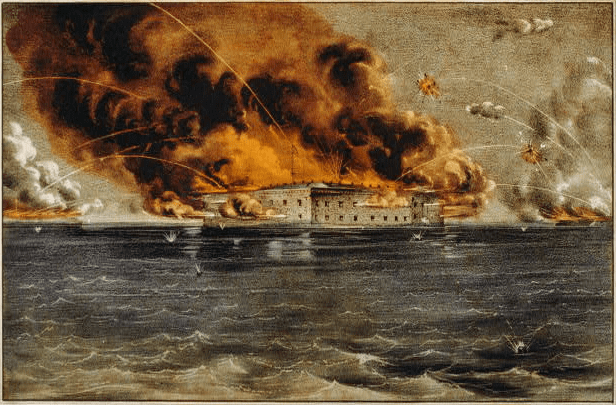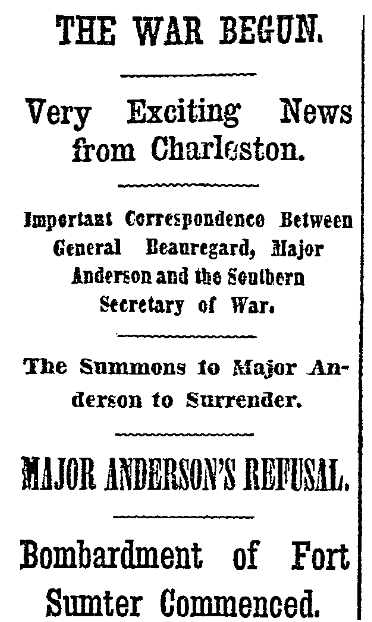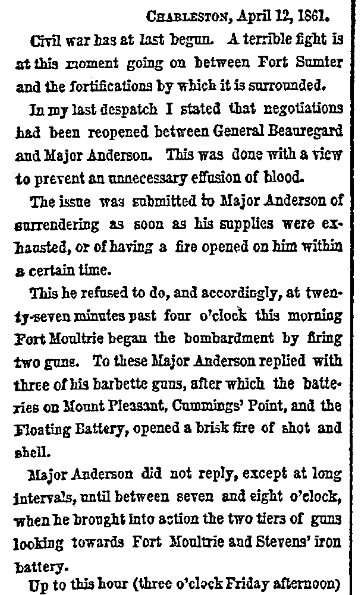The American Civil War began at 4:30 in the morning of 12 April 1861, when Confederate forces began a 34-hour bombardment of Fort Sumter, held by Union forces in Charleston Harbor, South Carolina.

The next day, readers picked up their local papers to read the news some dreaded but most knew was coming: war had begun.
The New York Herald began its war coverage with this front-page article.

Their correspondent’s opening line said it all: “Civil war has at last begun.”

Here is a transcript of this article:
The War Begun.
Very Exciting News from Charleston.
Important Correspondence between General Beauregard, Major Anderson and the Southern Secretary of War.
The Summons to Major Anderson to Surrender.
Major Anderson’s Refusal.
Bombardment of Fort Sumter Commenced.
Terrible Fire from the Secessionists’ Batteries.
Brilliant Defence of Maj. Anderson and His Gallant Garrison.
Reckless Bravery of the Confederate States Troops.
Sixteen Hours Fighting.
Breaches in the Walls of Fort Sumter.
Several of Major Anderson’s Guns Silenced.
Partial Cessation of the Firing for the Night.
Arrival of the Harriet Lane, Pawnee and Another Steamer off Charleston.
The Harriet Lane Fired Into.
Anticipated Attempt to Reinforce Fort Sumter.
Maps and Plans of the Scene of Conflict, &c.
Our Special Despatches from Charleston.
Charleston, April 12, 1861
Civil war has at last begun. A terrible fight is at this moment going on between Fort Sumter and the fortifications by which it is surrounded.
In my last despatch I stated that negotiations had been reopened between General Beauregard and Major Anderson. This was done with a view to prevent an unnecessary effusion of blood.
The issue was submitted to Major Anderson of surrendering as soon as his supplies were exhausted, or of having a fire opened on him within a certain time.
This he refused to do, and accordingly, at twenty-seven minutes past four o’clock this morning Fort Moultrie began the bombardment by firing two guns. To these Major Anderson replied with three of his barbette guns, after which the batteries on Mount Pleasant, Cummings’ Point, and the Floating Battery, opened a brisk fire of shot and shell.
Major Anderson did not reply, except at long intervals, until between seven and eight o’clock, when he brought into action the two tiers of guns looking towards Fort Moultrie and Stevens’ iron battery.
Up to this hour (three o’clock Friday afternoon) they have failed to produce any serious effect.
Despatches received at headquarters from the various forts report that all is going on admirably, and no men hurt.
Major Anderson has the greater part of the day been directing his fire principally against Fort Moultrie, the Stevens’ and Floating Battery, these and Fort Johnson being the only fire operating against him. The remainder of the batteries are held in reserve.
Some fifteen or eighteen shots have struck the Floating Battery, but made not the slightest impression upon its iron-cased sides. The Stevens’ Battery is also eminently successful, and does terrible execution on Fort Sumter.
Breaches, to all appearance, are being made in the several sides exposed to fire. Portions of the parapet have been destroyed, and several of the guns there mounted have been shot away.
Major Anderson is at present using his lower tier of casemate ordinance. The fight is going on with intense earnestness, and will continue all night. It is not improbable that the fort will be carried by storm.
The soldiers are perfectly reckless of their lives, and at every shot jump upon the ramparts, observe the effect, and then jump down, cheering. A party on the Stevens’ Battery are said to have played a game of the hottest fire.
The excitement in the community is indescribable. With the very first boom of the gun thousands rushed from their beds to the harbor front, and all day every available place has been thronged by ladies and gentlemen, viewing the solemn spectacle through their glasses. Most of these have relatives in the several fortifications, and many a tearful eye attested the anxious affection of the mother, wife and sister, but not a murmur came from a single individual.
The spirit of patriotism is as sincere as it is universal. Five thousand ladies stand ready today to respond to any sacrifice that may be required of them.
The brilliant and patriotic conduct of Major Anderson speaks for itself, and silences the attacks lately made at the North upon his character and patriotism.
Business is entirely suspended. Only those stores are open which are necessary to supply articles required by the army.
Governor Pickens has all day been in the residence of a gentleman which commands a view of the whole scene, a most interested observer. General Beauregard commands in person the entire operations, and thus far they have moved with the utmost system and success.
It is reported that the Harriet Lane has received a shot through her wheelhouse. She is in the offing. No other government ships are in sight up to the present moment, but should they appear the entire range of batteries will open upon them.
Troops are pouring into the town by hundreds, but are held in reserve for the present, the force already on the island being ample. People are also arriving every moment on horseback, and by every other conveyance. Within an area of fifty miles, where the thunder of the artillery can be heard, the scene is magnificently terrible.
Note: An online collection of newspapers, such as GenealogyBank’s Historical Newspaper Archives, is not only a great way to learn about the lives of your ancestors – the old newspaper articles also help you understand American history and the times your ancestors lived in, and the news they talked about and read in their local papers. Did any of your ancestors serve in the Civil War? Please share your stories with us in the comments section.
Related Civil War Genealogy Articles:
